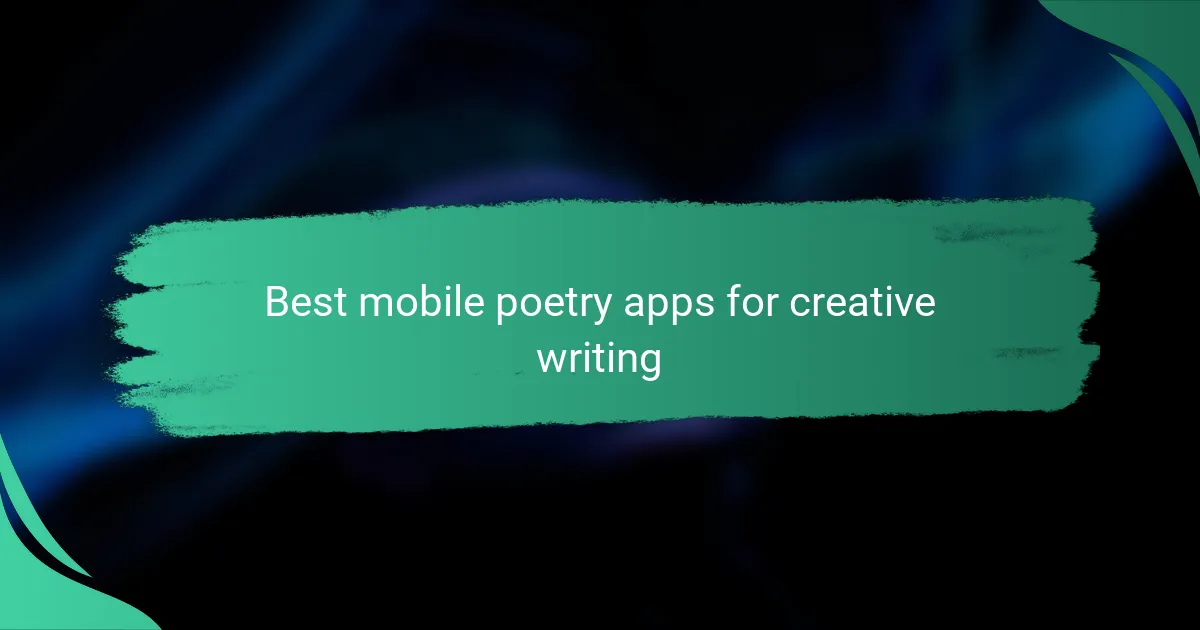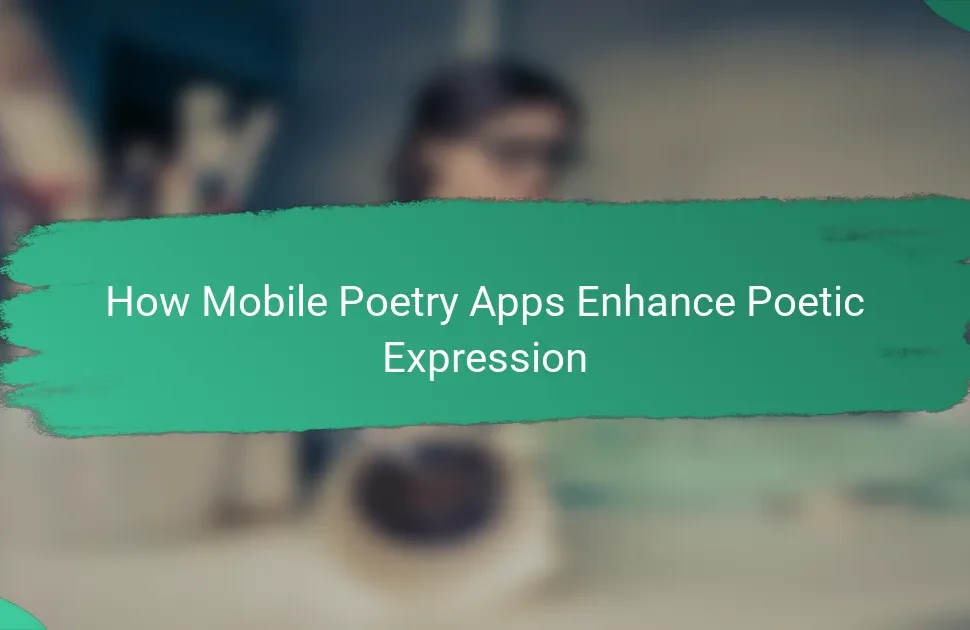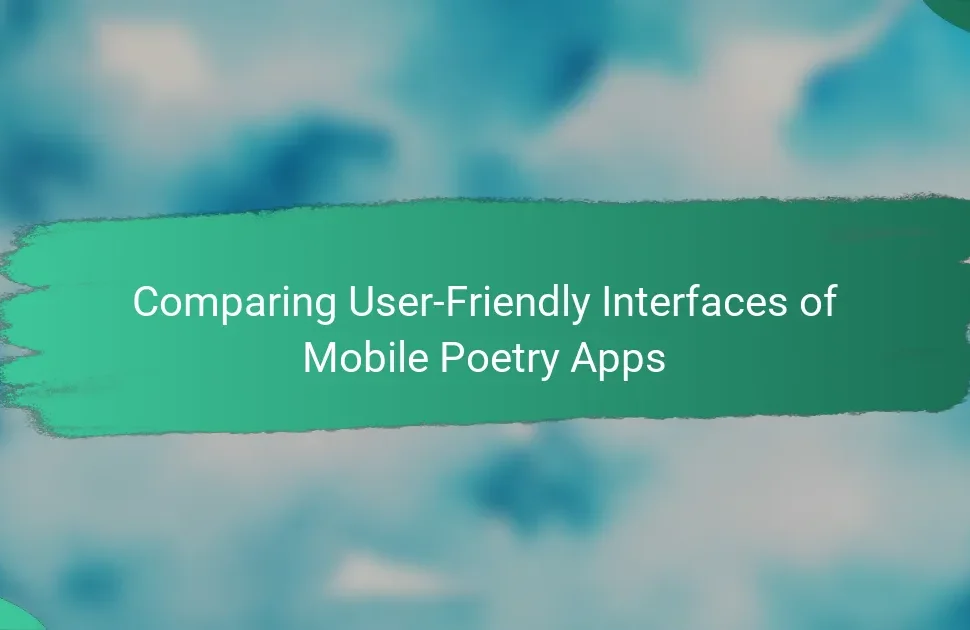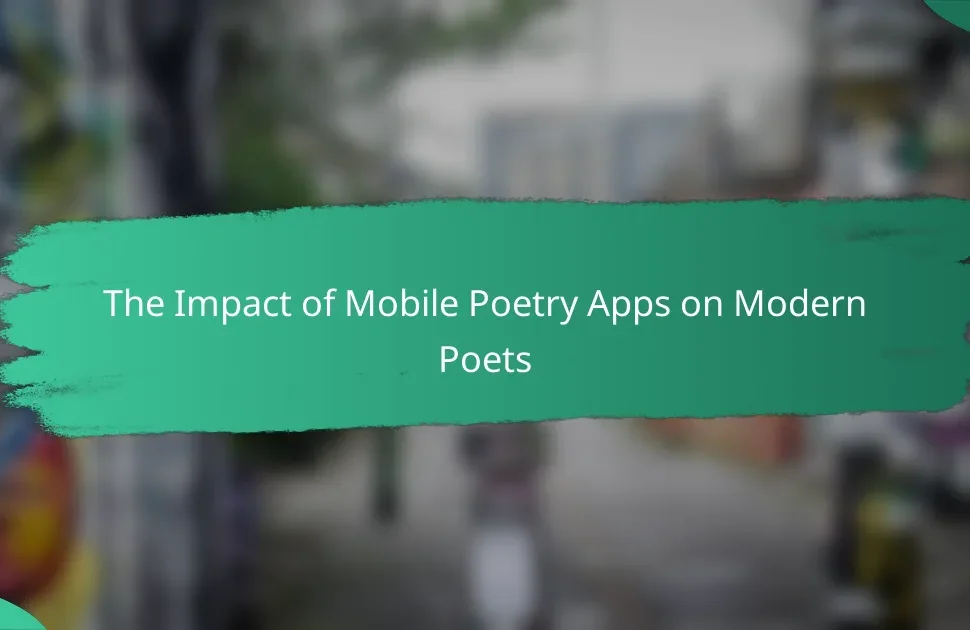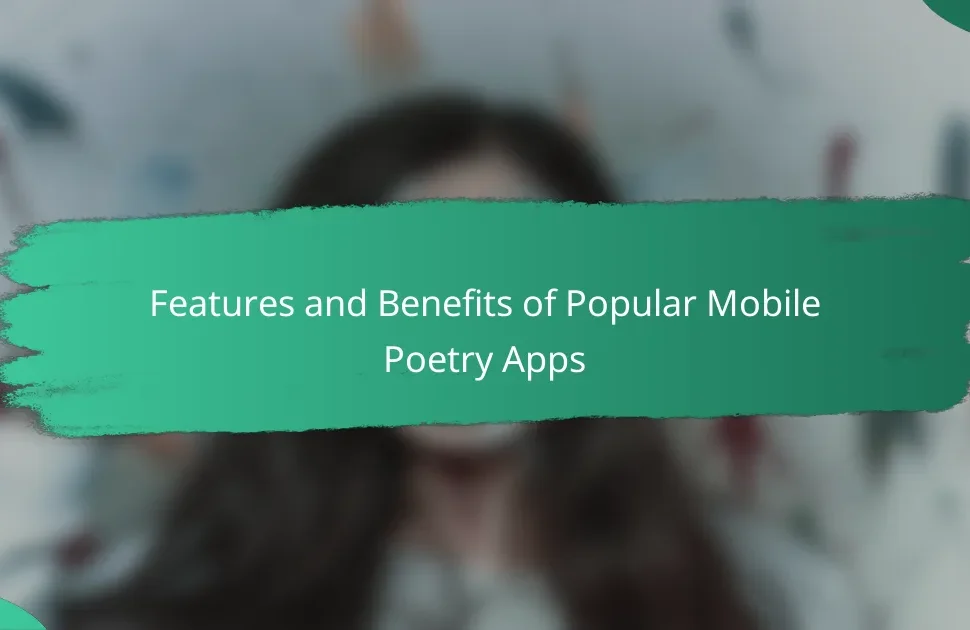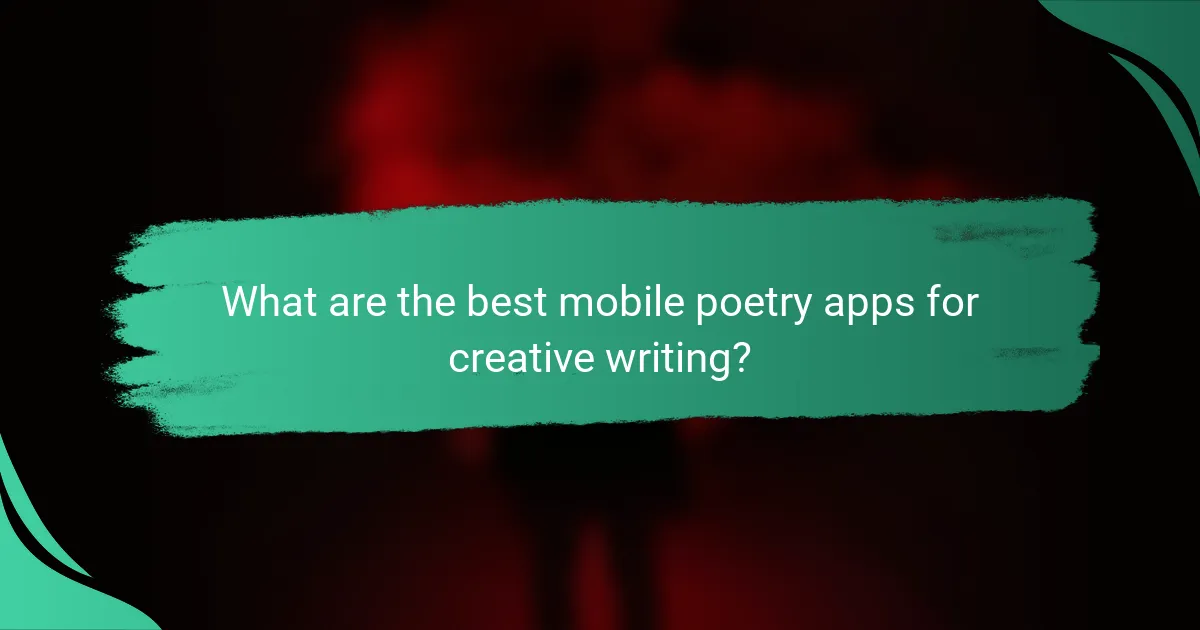
What are the Best Mobile Poetry Apps for Creative Writing?
The best mobile poetry apps for creative writing include Poetizer, Poet Assistant, and Verse. Poetizer is a social network for poets, allowing users to share their work and connect with others. Poet Assistant provides writing prompts and tools to help poets enhance their creativity. Verse offers a clean interface for writing and organizing poetry. These apps have gained popularity due to their user-friendly design and supportive communities. They are available on both iOS and Android platforms, making them accessible to a wide audience.
How do Mobile Poetry Apps enhance the creative writing process?
Mobile poetry apps enhance the creative writing process by providing tools that stimulate inspiration and facilitate expression. These apps often include features like prompts, rhyming dictionaries, and thesauruses. They allow users to write, edit, and share poetry easily. Many apps offer community engagement, enabling feedback and collaboration. The portability of mobile devices allows for writing on-the-go, capturing spontaneous ideas. Analytics in some apps track writing habits, helping users improve. Studies show that digital tools can increase creativity and productivity in writing tasks. Overall, mobile poetry apps serve as comprehensive platforms for both novice and experienced poets.
What features should you look for in a Mobile Poetry App?
Look for user-friendly interfaces in a mobile poetry app. A clean design enhances the writing experience. Additionally, search for features that allow for easy formatting of text. Options like line breaks, indentation, and font choices are essential. Cloud storage integration ensures your work is saved and accessible across devices. Collaboration tools enable sharing with other writers for feedback. Look for a library feature to organize and categorize your poems. Lastly, consider apps that offer prompts or inspiration to spark creativity. These features collectively enhance the functionality and usability of a mobile poetry app.
How do user interfaces impact the writing experience in these apps?
User interfaces significantly impact the writing experience in mobile poetry apps. A well-designed interface enhances usability and accessibility. Intuitive navigation allows users to focus on their creative process. Clear typography improves readability and reduces eye strain. Customizable features enable personalized writing environments. Responsive design ensures smooth performance across devices. Research shows that user satisfaction correlates with effective interface design. For instance, a study by Nielsen Norman Group highlights that usability directly influences user engagement and productivity.
What are the top-rated Mobile Poetry Apps available today?
The top-rated mobile poetry apps available today include Poetizer, Poetry Foundation, and Verse. Poetizer offers a social platform for poetry sharing and feedback. It has over 100,000 downloads and a user-friendly interface. Poetry Foundation provides access to a large database of poems and poet biographies. It is highly rated for its educational resources. Verse allows users to write, edit, and organize their poetry seamlessly. It features a clean design and easy navigation. Each of these apps has received positive reviews for enhancing the poetry writing experience.
What unique attributes do each of these apps offer?
It is not possible to answer the question as it lacks specific information about the apps being referenced. Without details on which apps are being discussed, I cannot provide unique attributes for each.
How do user reviews and ratings influence app selection?
User reviews and ratings significantly influence app selection. They provide potential users with insights into the app’s functionality and user experience. High ratings often indicate a reliable and well-received app. Conversely, low ratings can deter users from downloading an app. Research shows that 79% of consumers trust online reviews as much as personal recommendations. Additionally, 63% of consumers are more likely to use a business that has positive reviews. This data highlights the importance of user feedback in decision-making. Therefore, both reviews and ratings serve as critical factors in app selection.
Why is it important to choose the right Mobile Poetry App?
Choosing the right Mobile Poetry App is crucial for enhancing the creative writing process. A suitable app provides essential tools for writing, editing, and organizing poetry. It can offer features like rhyme dictionaries, prompts, and community engagement. These tools can stimulate creativity and improve writing skills. Additionally, the right app can facilitate easy sharing of work with peers. Research indicates that effective writing tools can lead to increased productivity and creativity in writers. Thus, selecting an appropriate app directly impacts the quality and enjoyment of the poetry writing experience.
How does the choice of app affect your writing style and creativity?
The choice of app significantly influences writing style and creativity. Different apps offer unique features that can enhance or restrict a writer’s expression. For instance, minimalist apps encourage simplicity, fostering concise language. Conversely, feature-rich apps provide tools for formatting and editing, which can inspire more complex structures. The user interface also plays a role; intuitive designs can boost productivity and creativity. Research indicates that writers using structured environments often produce more coherent and focused work. Overall, the app’s design and functionality directly shape the writing experience and outcomes.
What common pitfalls should you avoid when selecting a Mobile Poetry App?
Common pitfalls to avoid when selecting a Mobile Poetry App include overlooking user interface and experience. A complicated interface can hinder creativity. Users should also consider the app’s features. Limited formatting options can restrict poetic expression. Additionally, ignoring community engagement features can lead to isolation. Apps lacking sharing or feedback options may limit growth. Furthermore, neglecting compatibility with devices can cause accessibility issues. Users should check if the app supports their operating system. Lastly, failing to read reviews can result in poor choices. Research shows that user feedback often highlights critical app shortcomings.
How can you effectively use Mobile Poetry Apps for your writing?
To effectively use Mobile Poetry Apps for writing, start by selecting an app that suits your style. Many apps offer features like rhyme suggestions, prompts, and formatting tools. Use these features to enhance your creativity and streamline the writing process. Regularly explore the app’s community for feedback and inspiration from other poets. Set aside dedicated time for writing within the app to build a consistent practice. Utilize the app’s organizational tools to categorize and save your poems for easy access. Some apps also allow you to share your work, which can help you gain audience insights. Research shows that using digital tools can increase productivity in creative writing.
What are some best practices for maximizing the features of these apps?
To maximize the features of mobile poetry apps, users should explore all available tools. This includes using prompts and templates provided by the app. Engaging with community features fosters collaboration and feedback. Regularly updating the app ensures access to the latest features. Utilizing customization options tailors the writing experience to individual preferences. Setting aside dedicated time for writing enhances focus and productivity. Lastly, integrating multimedia features can enrich poetry presentation. These practices collectively enhance the creative writing process within mobile poetry apps.
How can you integrate Mobile Poetry Apps into your daily writing routine?
Integrate mobile poetry apps into your daily writing routine by setting specific writing times. Allocate 10 to 15 minutes each day for poetry creation. Use app features like prompts and templates to inspire creativity. Explore different styles or forms within the app to expand your writing skills. Save your work regularly to track progress and revisit ideas. Share your poems with a community feature for feedback and motivation. Utilize the app’s analytics to monitor your writing habits. Consistent use can enhance your poetic voice and discipline.
What tips can enhance your experience with Mobile Poetry Apps?
To enhance your experience with mobile poetry apps, focus on exploring diverse features. Utilize built-in prompts to spark creativity and overcome writer’s block. Take advantage of customizable settings for font size and background color to improve readability. Engage with community features to share your work and receive feedback. Regularly update the app to access the latest tools and enhancements. Experiment with different forms of poetry available in the app to expand your skills. Use audio recording features to capture spoken word performances for a unique touch. Lastly, set aside dedicated time for writing to cultivate a consistent practice.
The main entity of the article is mobile poetry apps for creative writing. The article provides an overview of the best mobile poetry apps, including Poetizer, Poet Assistant, and Verse, highlighting their user-friendly features and community engagement. It discusses how these apps enhance the creative writing process through tools like prompts and formatting options, while emphasizing the importance of selecting the right app to improve writing style and productivity. Additionally, the article outlines best practices for using these apps effectively and integrating them into a daily writing routine.
